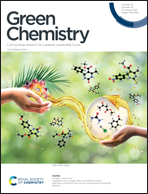Synthesis of a task-specific imidazolium-based porous triazine polymer decorated with ultrafine Pd nanoparticles toward alcohol oxidation†
Abstract
The properties of the catalyst support can greatly affect the catalytic performance. Therefore, it is very important to design and synthesize the catalyst support purposefully. Herein, a series of imidazolium-linked porous triazine polymers (IPTP) were synthesized through the Debus–Radziszewski reaction following click-chemistry principles. These IPTP with a high specific surface area were applied as supports to prepare ultrafine palladium (Pd) nanoparticles (NPs) through an ion exchange strategy, which facilitated the formation of ultra-small metallic NPs with an exposed main plane of Pd(111). The optimized 1Pd/IPTP-2 catalyst exhibited high activity and selectivity in the selective oxidation of alcohols to corresponding aldehydes under mild conditions without any additive. The catalyst was characterized in detail by multiple techniques such as SEM, TEM, XRD, solid-state NMR, XPS, and N2 and CO2 adsorption measurements. Comprehensive characterizations revealed that abundant imidazolium cations and triazine units in the mesoporous framework of IPTP promoted the stability of Pd NPs via the anchoring and confining effect. Moreover, the triazine units in IPTP serving as dual-functional sites can also act as the basic sites for accelerating the dehydrogenation of benzyl alcohol, which contributed to activity improvement. The crucial roles of the immobilization, basicity and mesoporous-structure derived from IPTP provide a viable strategy for the manufacture of highly active and stable catalysts for green alcohol oxidation.



 Please wait while we load your content...
Please wait while we load your content...